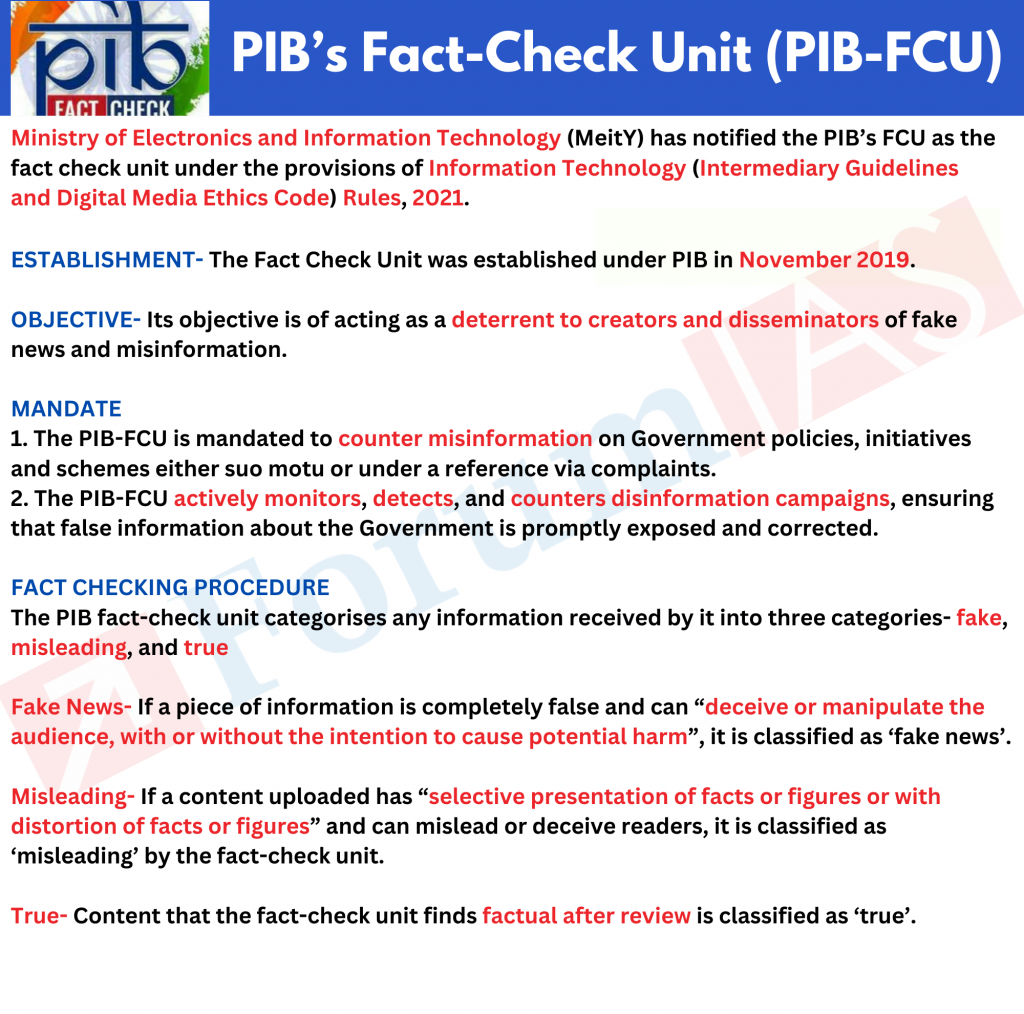ForumIAS announcing GS Foundation Program for UPSC CSE 2025-26 from 19 April. Click Here for more information.
ForumIAS Answer Writing Focus Group (AWFG) for Mains 2024 commencing from 24th June 2024. The Entrance Test for the program will be held on 28th April 2024 at 9 AM. To know more about the program visit: https://forumias.com/blog/awfg2024
Government of India has notified the PIB’s Fact-Check Unit (PIB-FCU) under the Ministry of Information and Broadcasting (MIB) as the fact check unit of the Central Government. Ministry of Electronics and Information Technology (MeitY) has notified the PIB’s FCU as the fact check unit under the provisions of Information Technology (Intermediary Guidelines and Digital Media Ethics Code) Rules, 2021.

What is PIB’s Fact-Check Unit (PIB-FCU)?
PIB’s Fact-Check Unit (PIB-FCU)- PIB’s Fact-Check Unit was established in November 2019 with a stated objective of acting as a deterrent to creators and disseminators of fake news and misinformation. It also provides people with an easy avenue to report suspicious and questionable information pertaining to the Government of India.
Functions/Mandate of PIB-FCU
a. The PIB-FCU is mandated to counter misinformation on Government policies, initiatives and schemes either suo motu or under a reference via complaints.
b. The PIB-FCU actively monitors, detects, and counters disinformation campaigns, ensuring that false information about the Government is promptly exposed and corrected.
c. When this unit flags a piece of content as fake, social media platforms will have to take it down as part of their due diligence requirement under the IT Rules. Also, the internet and telecom service providers like Jio and Airtel will have to block the web link of a particular fake news information.
What is Govt’s rationale for notifying PIB’s Fact-Check Unit (PIB-FCU) as the Central Govt’s Fact-check Unit?
1. Addressing the issue of fake news- This fact-checking body can help to address the issue of fake news and misinformation on online platforms, which can potentially cause harm to society.
2. Improved accountability of Social Media Intermediaries- The notification of PIB’s Fact-Check Unit as the Govt’s Fact-checking unit will increase accountability of social media intermediaries like Facebook, Twitter etc., which will now be required to remove false and misleading content.
3. Enhancement of Cybersecurity- PIB’s Fact-Check Unit can improve the cybersecurity by preventing the misuse of online platforms for illegal or harmful activities. For ex- Regulation of Sharing of Deepfakes.
4. Prevention of Hate Speech and Violence- The Fact-Check unit seeks to ensure compliance with Indian laws like IT Act and laws related to national security. This helps to prevent the misuse of social media platforms and other digital media outlets to incite violence or spread hate speech.
| Read More- Controlling Fake News in India and associated challenges |
What are the Concerns with notification of fact-check Unit by the Government of India?
1. ‘Chilling effect’ on freedom of speech and expression- There are concerns that PIB’s fact-check unit and its power to censor content could have a chilling effect on free speech and expression provided under Art 19(1)(a). There are concerns that people may be hesitant to express their opinions online for fear of being censored or facing legal consequences.
2. Potential for Misuse by the Govt- The fact-check unit’s power could be misused by the government to silence dissenting voices or criticism of government actions. This could have serious implications for democracy and human rights.
3. Conflict of interest- The role played by the fact-checking unit has a significant conflict of interest as it plays the role of judge, jury and executioner.
4. Lack of clarity on what constitutes “fake or false or misleading” information- There is lack of a clear definition of what types of information qualify as ‘fake or false or misleading‘. This lack of clarity creates ambiguity and can lead to arbitrary censorship by the government.
5. Short-circuiting established legal procedures- The notification of a fact-checking unit with powers to issue directions to take down content, short-circuit the procedures, safeguards and conditions laid out in Shreya Singhal v. Union of India and Section 69A of the IT Act. The judgement extends the right to free speech into the online space.
What Should be the Way Forward?
1. Early Judgement of the Bombay High Court- The Kunal Kamra v. Union of India (2023) case challenging the notification of fact-check unit of the Central Government, must be decided by the Bombay High Court at the earliest which will establish its constitutionality.
2. Building consensus among political parties- With Opposition political parties criticising the notification of PIB’s fact-check unit as the Govt’s official fact check body, the government must build consensus by assuring them of ‘credible’ functioning of the body.
3. Develop a more transparent and participatory process- The government should work with civil society, media organizations, and other stakeholders to develop a more transparent and participatory process for determining what content should be considered fake or misleading.
4. Need an independent and non-partisan fact-checking body- The government should ensure that anybody tasked with fact-checking is independent and non-partisan, with clear guidelines for how decisions are made.
5. Ensure functioning according to judicial and legal guidelines- The government should ensure that any takedown requests are made in accordance with the procedures and safeguards laid out in Shreya Singhal v. Union of India or under Section 69A of the IT Act. These define and restrict the conditions under which government can take down online content.
| Read More- The Indian Express UPSC Syllabus- GS 3 Security Issues – The role of media and social networking sites in internal security challenges GS 2- Government Interventions for regulation of the sector |




